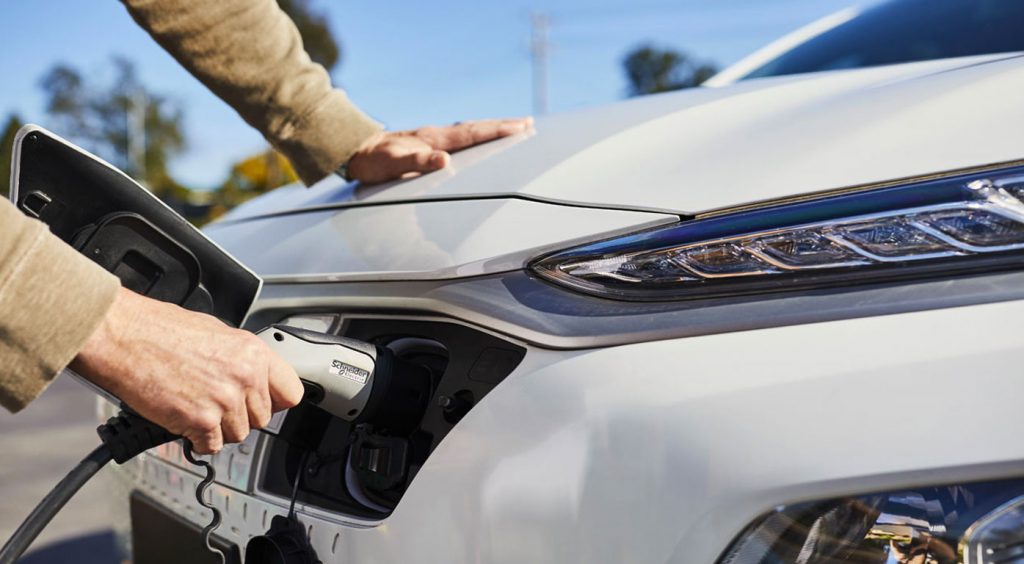Australian smart charging trial prepares for EV growth
Innovative ways of charging electric vehicles in residential settings will be trialed as part of a new ARENA-funded project.

AGL will recruit 300 electric vehicle owners to trial smart charging points, smart charging software and vehicle-to-grid technology as part of ARENA’s work to help integrate EVs into the electricity network.
The project will install 200 smart charging points that can be remotely monitored and controlled in EV owners’ homes, helping to shift charging to off-peak times to take advantage of cheaper electricity and respond to strain on the grid.
A further 50 households will trial smart charging software that allows network operators to communicate directly with cars, avoiding the need for separate smart charging hardware.
The third group of 50 EV owners will participate in a vehicle-to-grid trial, testing the use of EVs as a way of storing energy to power their homes and supporting the grid.
The participants in AGL’s trial will be located across Victoria, New South Wales, Queensland and South Australia.
ARENA is providing $2.9 million of funding towards the $8.25 million project, which will be spent on hardware, installations and software development, with additional support to be provided by partners JET Charge, Chargefox, FlexCharging and a group of electricity distribution networks.
ARENA CEO Darren Miller said the trials will help to manage the rollout of EVs in a way that provides value for customers and supports the electricity network.
“As more Australians switch to EVs, it will be important to manage and orchestrate EV charging to avoid potentially costly impacts on peak demand, associated network charges and grid security issues,” Mr Miller said.
“EVs also provide economic opportunities for consumers through the potential of reduced electricity costs through higher network utilisation and the potential to generate revenues that would reduce the cost of car ownership.”
EV charging accelerating
The project offers the first opportunity for Australians to use vehicle-to-grid capability to power their homes or take advantage of software based smart charging, which AGL says will show how value can be created from customers’ distributed energy assets and shared with them.
“We’ll be talking to customers during the trial to understand how they feel about smart charging so we can improve their experience, AGL General Manager of Decentralised Energy Resources Dominique Van Den Berg said.
“Although the trial is limited to 300 customers, it will help us to shape future energy offers to EV owners.”
The mix of technologies have been selected according to their maturity, with smart chargers making up the largest group in the trial and software based smart charging and vehicle-to-grid technology offering considerable future potential.
The findings will provide an evidence base for electricity retailers, distribution networks and EV owners on the potential of these technologies, as well as how the benefits can be valued. The project will also provide insights into the behaviour of participants, which will help to recruit customers and provide the best value beyond the initial trials.
Smart opportunities
Alongside its work to create Australia’s largest publicly accessible EV charging network, project partner Chargefox has years of experience installing residential charging systems and already supported demand management trials with AGL.
Chargefox CEO Marty Andrews told ARENA that smart charging will be important as EV use grows in Australia, creating new challenges and opportunities for electricity use.
“Peak demand for electricity is higher with widespread EV adoption, however EVs are essentially batteries on wheels, with enormous potential to leverage stored energy capacity and address both new and existing concerns in energy infrastructure,” Mr Andrews said.
“Chargers are the physical piece that connects EVs to the grid, and smart charging is the technology that underpins potential new solutions like using EVs for Australian energy needs.”
He believes that the software based approach will be the only way to address charging challenges at scale as EVs numbers grow.
“Hardware based approaches can create micro-solutions where, for example, a homeowner can optimise the use of their solar for charging. Only software solutions can address these issues at scale, where infrastructure needs to be managed to extend its life, or an energy retailer needs to manage demand during the peaks of summer.”
He predicts that the increased connectivity offered by the Internet of Things (IoT) will flow through to EV charging. “Local hardware solutions offer local reliability, but being connected to software services creates far greater opportunity,” he said.
Smart charging on the agenda
AGL’s trial builds on a recently announced project led by fellow gentailer Origin Energy, which is installing 150 smart chargers at residential, commercial and industrial premises across New South Wales, Victoria, Queensland and South Australia.
Like the AGL trial, Origin will remotely monitor and shift charging to periods when renewables are strongest and wholesale electricity prices are lowest, helping to improve the economics and appeal of EVs.

ARENA funding has also supported ActewAGL’s vehicle-to-grid trial involving ACT Government fleet vehicles in Canberra, and the construction of the Chargefox and Evie intercity ultra fast charging networks.
Read more about ARENA’s portfolio of EV projects here.
LIKE THIS STORY? SIGN UP TO OUR NEWSLETTER

ARENA